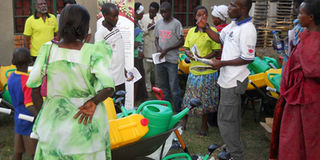Farmers and cooks to attend Slow Food event

Members of Lukindu Community Garden in Lwengo District get tools donated to them by Slow Food. PHOTO BY MICHAEL J. SSALI
Representatives of more than 130 countries, including Uganda, will meet in Turin, Italy, October 23-27, for the international Salone del Gusto (Food Exhibition).
Slow Food, an international organisation dedicated to good, clean and fair food, has organised the event with the support of the city of Turin, and the Italian Ministry of Agricultural Food and Forestry Policies.
A press release from the organisers states that it is to be combined with the international meeting of Terra Madre food communities. In the past few years, Slow Food has been behind formation of community gardens under the Terra Madre programme including 10,000 of them in 38 countries and 350 communities of Africa.
Actively involved
Uganda will send a delegation of farmers, agricultural experts and cooks to the Salone del Gusto where they will showcase farming practices and cooking methods of the various indigenous food crops.
There will be a Cooking School, which is Slow Food’s approach to food education and participants will be actively involved in the preparation of dishes.
Also expected are distinguished speakers on a range of topics such as environment, agriculture, health, population, climate change, and global hunger. There will be display of indigenous foods that are at risk of extinction. Also, the event will provide space for telling the individual stories of the foods that belong to the cultures, history and traditions of the entire planet and explain their real commonly overseen value.
Different levels
The other preoccupation will be Family Farming to which the UN has dedicated 2014. “Family farming is an important path for inclusion for millions of poor rural families and communities, and are of special importance for women and for youth,” said Graziano da Silva, Secretary General, Food and Agriculture Organisation (FAO).
Last year, FAO and Slow Food signed a three-year-agreement to promote food production and agriculture systems at local, national and international levels. It put particular emphasis on the value of local foods and neglected (orphaned) food crops while also targeting market access, conservation and use of biodiversity, reducing food losses and food waste, and improving animal welfare. “Food gardens introduced by Slow Food produce far more than simply food,” said da Silva. “They promote inclusion, teach sustainability, and offer a space where the youth can meet, learn, share and build social capital. Food gardening has opened the door to opportunities for decent jobs and a dignified life.”
Local not foreign
In his speech last year during a visit to Lukindu Community Garden in Masaka, Paolo Di Crose, Slow Food secretary general, emphasised to Ugandans to be proud of their traditional food crops and to save them from extinction. He urged the farmers to grow the traditional food crops in their gardens and to eat them instead of growing and eating foods from foreign countries and regarding them as superior to their local ones. “When you eat matooke or millet, be proud of it because it is linked to your community and culture,” he said.
Each community garden is owned by about 30 households and serves as a demonstration where the farmers meet regularly to share knowledge and innovations. They also once in a while prepare a meal which they eat together.
Uganda has more than 60 community gardens, nearly all of them created and launched by Eddie Mukiibi, was appointed Vice President of Slow Food. Before that, he was the National Coordinator in Uganda and a member of the Slow Food executive committee since 2012.




